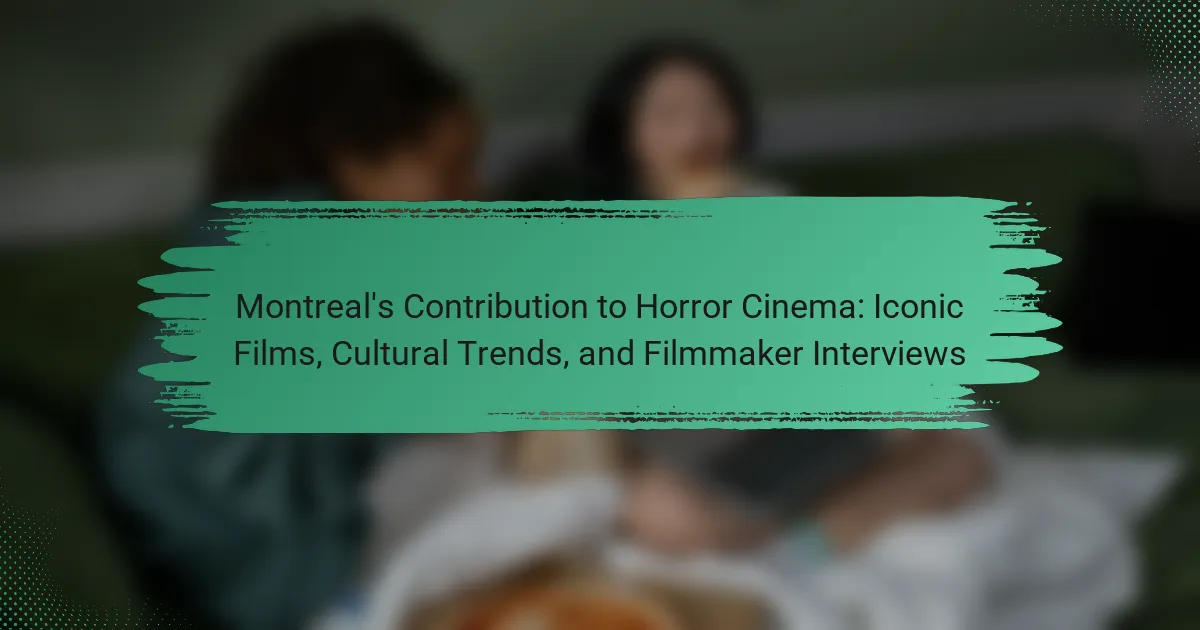Montreal is a significant hub for horror cinema, known for producing influential films such as “Martyrs” and “The Brood.” The city’s vibrant filmmaking community fosters creativity, supported by events like the Fantasia International Film Festival, which showcases genre films and emerging talent. Interviews with filmmakers provide insights into their creative processes, motivations, and the challenges they face, enriching the audience’s understanding of Montreal’s unique cultural influences in horror narratives. The distinct architecture and atmosphere of Montreal serve as a compelling backdrop for numerous horror productions, enhancing the cinematic experience and highlighting the city’s contributions to the genre.

What is Montreal’s Contribution to Horror Cinema?
Montreal has significantly contributed to horror cinema through its unique films and vibrant filmmaking community. The city is known for producing iconic horror films such as “Martyrs” and “The Brood.” These films have gained international acclaim and have influenced the genre. Montreal’s diverse cultural landscape fosters creativity among filmmakers. The city’s film festivals, like Fantasia, showcase horror and genre films, attracting global attention. Additionally, Montreal serves as a filming location for numerous horror productions due to its distinct architecture and atmosphere. The local industry supports emerging talent, contributing to innovative storytelling in horror cinema.
How has Montreal influenced the horror film genre?
Montreal has significantly influenced the horror film genre through its unique cultural landscape and filmmaking community. The city provides a rich backdrop that enhances the atmospheric quality of horror films. Notable films such as “Martyrs” and “The Brood” showcase Montreal’s distinctive architecture and urban settings, contributing to their eerie aesthetics. The city’s diverse population fosters innovative storytelling and character development in horror narratives. Additionally, Montreal hosts the Fantasia International Film Festival, which highlights emerging horror filmmakers and promotes genre diversity. This festival has launched the careers of many influential directors within the horror genre. The combination of artistic resources and a supportive film community makes Montreal a vital hub for horror cinema.
What are the historical roots of horror cinema in Montreal?
Horror cinema in Montreal has roots dating back to the early 20th century. The city became a hub for filmmaking with the establishment of the National Film Board of Canada in 1939. Early horror films, such as “The Witch” (1934), showcased local talent and settings. The 1970s marked a significant rise in horror production, influenced by global cinematic trends. Iconic films like “Rabid” (1977) by David Cronenberg emerged during this period. Cronenberg’s work, often blending horror with psychological themes, garnered international acclaim. The city’s unique architecture and culture provided a rich backdrop for horror narratives. Montreal’s film festivals, such as Fantasia, further promote horror cinema and its creators today.
How does Montreal’s culture shape its horror film narratives?
Montreal’s culture significantly shapes its horror film narratives through its rich history, diverse population, and unique urban landscape. The city’s blend of French and English influences creates a distinct cultural backdrop that informs storytelling. Themes of identity and duality often emerge in horror narratives, reflecting the multicultural dynamics of Montreal.
The urban environment, with its gothic architecture and vibrant neighborhoods, adds an atmospheric quality to horror films. Filmmakers often draw inspiration from local myths and legends, integrating them into their narratives. The city’s festivals, such as Fantasia International Film Festival, promote horror cinema and encourage local talent.
Additionally, Montreal’s artistic community fosters collaboration among filmmakers, writers, and artists, leading to innovative horror concepts. The city’s history of social and political unrest also influences horror themes, exploring fears and anxieties relevant to its residents. Overall, Montreal’s culture provides a rich tapestry that enhances the depth and creativity of its horror film narratives.
What iconic horror films originated from Montreal?
Iconic horror films that originated from Montreal include “Martyrs,” “The Brood,” and “Inside.” “Martyrs,” directed by Pascal Laugier, is known for its intense psychological horror and was released in 2008. “The Brood,” directed by David Cronenberg, was released in 1979 and explores themes of trauma and the mind. “Inside,” a 2007 film directed by Alexandre Bustillo and Julien Maury, is recognized for its brutal and suspenseful narrative. These films have significantly impacted the horror genre and showcase Montreal’s unique contributions to cinema.
Which films are considered milestones in Montreal’s horror cinema?
“Rabid” (1977) and “The Brood” (1979) are considered milestones in Montreal’s horror cinema. Directed by David Cronenberg, “Rabid” explores themes of body horror and contagion. It was one of Cronenberg’s early works that established his reputation. “The Brood” further developed his unique style, focusing on psychological horror and the effects of trauma. Both films were pivotal in shaping the Canadian horror landscape. They showcased Montreal as a significant location for innovative horror filmmaking. Their impact is evident in subsequent Canadian horror productions.
How have these films impacted the global horror genre?
These films have significantly influenced the global horror genre by introducing innovative storytelling techniques. Montreal’s horror films often blend psychological elements with supernatural themes. This unique approach has inspired filmmakers worldwide to explore deeper emotional narratives in horror. Iconic films from Montreal have also showcased diverse cultural perspectives. This has encouraged a broader representation of horror narratives across different cultures. The success of these films has led to increased international collaboration in horror cinema. Additionally, Montreal has become a hub for horror film festivals, promoting global engagement. Overall, the impact of these films is evident in the evolving landscape of horror worldwide.
What cultural trends in Montreal have influenced horror cinema?
Montreal’s cultural trends have significantly influenced horror cinema through its vibrant arts scene and diverse population. The city’s unique blend of French and English cultures fosters a rich narrative style in films. This bilingual environment allows for varied storytelling techniques and themes. Additionally, Montreal’s history of urban legends and ghost stories provides a rich backdrop for horror narratives. The city’s architecture, featuring gothic and historic elements, often serves as an atmospheric setting in horror films. Festivals like Fantasia International Film Festival showcase innovative horror works, highlighting local talent. The influence of local filmmakers, such as Xavier Dolan and Denis Villeneuve, introduces fresh perspectives in the genre. Overall, Montreal’s cultural dynamics create a fertile ground for horror cinema to thrive.
How do local folklore and legends appear in Montreal horror films?
Local folklore and legends significantly influence Montreal horror films. These films often incorporate elements from Quebec’s rich cultural heritage. Tales of the “Loup-Garou” or werewolf are frequently depicted, emphasizing regional fears and myths. The urban landscape of Montreal also serves as a backdrop for these narratives, enhancing their authenticity. Films like “Les Affamés” showcase the integration of local legends with modern horror tropes. This blend creates a unique storytelling approach that resonates with both local and international audiences. Additionally, filmmakers often draw inspiration from historical events and figures, adding depth to the horror elements. The use of local dialects and settings further grounds the stories in Montreal’s distinctive identity. Overall, local folklore enriches the horror genre by providing a cultural context that enhances the narrative experience.
What role does the Montreal International Festival of Horror play?
The Montreal International Festival of Horror plays a significant role in promoting horror cinema. It serves as a platform for filmmakers to showcase their work. The festival highlights both emerging and established talent in the genre. It attracts audiences who appreciate horror films and related content. The festival also fosters discussions about horror’s cultural impact. It provides networking opportunities for industry professionals. Additionally, it contributes to the local economy through tourism. The festival has gained recognition for its diverse programming and engaging events.

What insights can we gain from filmmaker interviews?
Filmmaker interviews provide valuable insights into the creative process behind horror cinema. They reveal the motivations and inspirations driving the filmmakers. Interviews often discuss the challenges faced during production. Filmmakers share their perspectives on storytelling techniques and genre conventions. These conversations can highlight cultural influences specific to Montreal’s horror scene. Additionally, interviews can uncover personal anecdotes that enrich the audience’s understanding of the films. They also offer a glimpse into future projects and trends in the genre. Overall, filmmaker interviews enhance the appreciation of horror cinema’s artistic and cultural significance.
Who are the key filmmakers contributing to Montreal’s horror scene?
Key filmmakers contributing to Montreal’s horror scene include Xavier Dolan and Denis Villeneuve. Xavier Dolan is known for blending genres, including horror elements in his films. His unique style has garnered international attention. Denis Villeneuve has directed acclaimed films such as “Incendies” and “Enemy,” which incorporate psychological horror themes. Other notable filmmakers are Pascal Laugier, recognized for “Martyrs,” a significant film in the extreme horror subgenre. Additionally, Jennifer Kent, known for “The Babadook,” has influenced the genre with her psychological approach. These filmmakers have collectively shaped Montreal’s horror landscape through innovative storytelling and stylistic choices.
What unique perspectives do these filmmakers bring to their work?
These filmmakers bring diverse cultural backgrounds and personal experiences to their work. Their unique perspectives often reflect Montreal’s multicultural environment. Many incorporate local folklore and history into their narratives. This adds authenticity and depth to their storytelling. They challenge conventional horror tropes, introducing innovative themes. Their films often explore psychological and social issues relevant to contemporary society. Collaborations with local artists enrich their creative vision. This results in a distinct style that sets Montreal horror cinema apart.
How do filmmakers describe their experiences working in Montreal?
Filmmakers describe their experiences working in Montreal as highly positive and creatively enriching. They often highlight the city’s unique blend of cultural influences. Many filmmakers appreciate the diverse locations available for shooting. The local film community is noted for being supportive and collaborative. Filmmakers also mention the city’s vibrant arts scene as inspiring. Additionally, Montreal offers various financial incentives for film production. These factors contribute to a favorable working environment. Overall, filmmakers view Montreal as a significant hub for creativity and innovation in cinema.
What themes do Montreal filmmakers explore in horror cinema?
Montreal filmmakers explore themes of identity, culture, and urban isolation in horror cinema. These themes often reflect the city’s diverse population and complex history. Filmmakers incorporate elements of folklore and mythology, drawing from both local and global narratives. Psychological horror is prevalent, focusing on the human psyche and personal trauma. Social commentary on issues like immigration and multiculturalism is also common. The blending of genres, such as horror with dark comedy, showcases innovative storytelling. Overall, Montreal’s horror films are characterized by a unique blend of local influences and universal fears.
How do these themes reflect societal issues in Montreal?
The themes in Montreal’s horror cinema reflect societal issues such as urban isolation and cultural diversity. Urban isolation is depicted through characters facing personal struggles in a bustling city. This mirrors the real-life experiences of many Montreal residents who feel disconnected in a densely populated environment. Cultural diversity is showcased by the incorporation of various cultural elements and perspectives in horror narratives. This highlights the multicultural fabric of Montreal, where different backgrounds coexist. Additionally, themes of gentrification appear in horror films, representing the tension between tradition and modernization in neighborhoods. These cinematic elements serve as a commentary on the challenges faced by Montreal’s communities, making the films relevant to societal discussions.
What innovations in storytelling can be seen in their films?
Montreal’s films showcase several innovations in storytelling. They often integrate non-linear narratives, allowing for complex character development and plot twists. This approach enhances audience engagement by challenging traditional storytelling structures. Additionally, films from Montreal frequently utilize immersive visual styles. Techniques like blending animation with live-action create unique storytelling experiences. Another innovation is the incorporation of cultural elements specific to Montreal. This adds authenticity and depth to the narratives. The use of psychological themes is also prevalent, exploring characters’ inner conflicts and fears. These innovations have significantly influenced the horror genre, pushing creative boundaries.

How can audiences appreciate Montreal’s horror cinema?
Audiences can appreciate Montreal’s horror cinema by engaging with its unique storytelling and cultural context. The city has a rich history in the horror genre, with films like “Martyrs” and “Les Affamés” showcasing local talent. Attending film festivals such as Fantasia International Film Festival highlights emerging filmmakers and innovative works. Exploring behind-the-scenes interviews with directors and actors provides insight into the creative process. Participating in local screenings and discussions fosters community engagement. Understanding the influence of Montreal’s diverse culture enhances appreciation of its horror narratives. The city’s distinct architecture and atmosphere often serve as a backdrop, enriching the cinematic experience.
What are the best ways to explore Montreal’s horror films?
Attend local film festivals focused on horror, such as the Montreal Horror Fest. These festivals showcase independent horror films and often include Q&A sessions with filmmakers. Visit iconic filming locations around the city featured in popular horror films. Engage with local film communities through social media and forums dedicated to horror cinema. Explore specialized film screenings at local theaters that focus on horror genres. Take guided tours that highlight Montreal’s history in horror filmmaking. Read books and articles about Montreal’s horror film history for deeper insights.
Which festivals or events should horror enthusiasts attend?
Horror enthusiasts should attend the Fantasia International Film Festival. This festival is held annually in Montreal. It is renowned for showcasing horror, fantasy, and sci-fi films. The festival attracts filmmakers and fans from around the world. Another notable event is the Montreal Horror Fest. This festival focuses on horror culture and includes screenings, panels, and workshops. Additionally, the Montreal International Black Film Festival features horror films that explore diverse narratives. These festivals provide unique opportunities for horror fans to engage with the genre.
How can viewers engage with the local horror film community?
Viewers can engage with the local horror film community by attending screenings and festivals. Montreal hosts several horror film events, such as the Fantasia International Film Festival. These events provide opportunities to watch new films and meet filmmakers. Viewers can also participate in local horror film clubs or groups. Joining online forums or social media pages dedicated to horror films in Montreal facilitates discussions. Volunteering at local film events helps build connections within the community. Additionally, supporting local filmmakers by sharing their work on social media encourages further engagement. Engaging with local horror-themed events fosters a sense of community among fans and creators.
What tips can enhance the viewing experience of Montreal horror films?
To enhance the viewing experience of Montreal horror films, viewers should engage with the film’s cultural context. Understanding Montreal’s unique blend of French and English influences adds depth to the narrative. Watching in a dark, quiet environment heightens suspense and immersion. Utilizing high-quality audio equipment enhances sound design, which is crucial in horror films. Participating in local screenings or festivals fosters community engagement and shared experiences. Exploring the filmmaker’s background can reveal thematic layers and intentions. Lastly, considering the film’s historical significance within Montreal’s cinema landscape enriches appreciation.
How can understanding cultural context improve appreciation?
Understanding cultural context enhances appreciation by providing deeper insights into themes and narratives. Cultural context informs the motivations behind characters and plot developments. It reveals how societal norms influence storytelling techniques. For instance, horror films from Montreal often reflect local history and folklore. This connection allows viewers to recognize unique cultural references. Understanding these elements fosters a richer viewing experience. Research shows that audiences engage more deeply when they grasp cultural nuances. This engagement leads to a more profound emotional response to the film.
What should viewers look for when watching Montreal horror films?
Viewers should look for unique cultural elements when watching Montreal horror films. These films often reflect the city’s diverse heritage. They incorporate themes from French and English-speaking cultures. Viewers can also expect innovative storytelling techniques. Many Montreal horror films push genre boundaries. The use of local settings enhances the authenticity of the narrative. Additionally, viewers should pay attention to the film’s visual style. Montreal filmmakers often experiment with cinematography and sound design. These aspects contribute to the overall atmosphere of fear and suspense.
Montreal is a significant entity in horror cinema, known for its iconic films such as “Martyrs,” “The Brood,” and “Inside.” The article explores Montreal’s historical roots in horror filmmaking, highlighting the influence of its unique cultural landscape and diverse population on the genre. It discusses the role of local film festivals, particularly the Fantasia International Film Festival, in promoting emerging talent and innovative storytelling. Additionally, insights from filmmaker interviews reveal the themes and innovations that characterize Montreal’s horror films, reflecting societal issues and cultural dynamics within the city.


